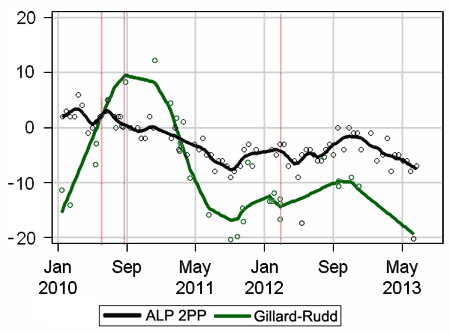The prime ministership of Julia Gillard began hopefully, with the first polling indicating cautious endorsement of her coup against Kevin Rudd and a measure of excitement about the emergence of Australia’s first female prime minister.
Essential Research found a clear but not overwhelming majority of respondents in support of the takeover (47% against; 40% opposed), while Labor’s primary vote surged back into the 40s after a period in the doldrums.
In hindsight, it can be seen that Gillard’s strong early ratings were mostly indicative of the shallow impressions that emerge in “honeymoon” polling, an early taste of which was offered by last night’s instant Morgan SMS poll showing the effective disappearance of the Coalition’s enormous lead.
The chart below plots head-to-head Gillard-versus-Rudd polling conducted by various agencies since the start of 2010 (in green), the results of which are represented as Gillard’s lead or deficit compared with Rudd, together with Labor’s two-party lead or deficit as measured by Newspoll:

The three vertical red lines successively mark the point of Gillard’s leadership takeover in late June 2010, the election the following August 21, and Rudd’s unsuccessful leadership challenge of February last year.
The progress of the trend lines tells a clear story in two parts. The first finds Gillard surging to a 10-point lead over Kevin Rudd in the immediate aftermath of the takeover, which appears to carry through to early 2011 despite a paucity of data in this period.
The second part begins with a collapse in Gillard’s ratings concurrent with the carbon tax announcement, after which the two lines travel almost in parallel.
The steepness of Gillard’s decline in this period is telling, as it suggests she had previously benefited from the instinct of poll respondents to be fair-minded towards newcomers of whom they had yet to form a firm impression (something Rudd experienced himself when huge poll leads through the first two years of his prime ministership rapidly dissipated in early 2010).
The souring of opinion against her encouraged a retrospective perception that the leadership takeover had been illegitimate, and she trailed far behind Rudd in all subsequent polling.
Rudd, of course, returns to the Lodge a better known quantity than Gillard had been in June 2010, so it might be argued that initial impressions will prove more substantial this time around. Nonetheless, polling over the next few weeks will be conducted among a public primed by the human interest story of Rudd’s triumphant return after humiliation and a long march through the wilderness.
Expect the results to be highly volatile, and to serve as a more than usually unreliable guide to how things might play out at a real election.








Surely the important question is which of the Tweedle twin parties is hated more – no-one pretends that they are wanted, just one less than the other, indistinguishable though they are.
More Independents & Greens in another minority government is the only intelligent outcome to be hoped for.
Rudd had better get a move on before hubris bites him on the bum.
On what basis is it claimed that the view of the ousting of Rudd as being illegitimate was only a view in retrospect? Any data to support this claim?